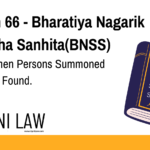Section 475 CrPC: Delivery of Persons to Commanding Officers for Court-Martial
1. State the code
Section 475 of the Code of Criminal Procedure, 1973 (CrPC) states:
“When any person subject to military law is accused of an offence triable by court-martial, the Magistrate, upon being satisfied that the person accused is so subject, shall deliver him to the commanding officer of the force to which he belongs, for the purpose of being dealt with according to military law.”
2. Explain it
Section 475 CrPC outlines the procedure for handing over individuals subject to military law to their commanding officers for court-martial proceedings.
- Applies to Military Personnel: This section is applicable only to individuals who are subject to military law, such as members of the armed forces.
- Accused of Offence Triable by Court-Martial: The individual must be accused of an offence that is within the jurisdiction of a court-martial, as defined by military law.
- Magistrate’s Satisfaction: The Magistrate must be satisfied that the accused person is indeed subject to military law before delivering them to the commanding officer.
- Delivery to Commanding Officer: The Magistrate is required to hand over the accused person to the commanding officer of the force to which they belong.
- Court-Martial Proceedings: Once delivered, the accused person will be dealt with according to the rules and procedures of military law, including the possibility of a court-martial trial.
3. Illustrate it
Consider a scenario where a soldier stationed at a military base is accused of theft. A civilian police officer investigates the case and arrests the soldier. Upon investigation, the police officer determines that the offence falls under military law and the soldier is subject to court-martial. In this situation, the police officer, acting as the Magistrate, would be obligated to deliver the soldier to the commanding officer of their unit for further proceedings under military law.
4. Common Questions and Answers
Q: What happens if a person subject to military law is accused of a civilian offence?
A: In such cases, the police may investigate the offence, and if sufficient evidence exists, they can arrest the individual. However, if the offence is also triable by court-martial, the police will ultimately be required to deliver the accused person to the commanding officer for court-martial proceedings according to Section 475 CrPC.
Q: What are the rights of a person accused of an offence triable by court-martial?
A: While Section 475 CrPC deals with the delivery process, the accused person retains certain rights under both civilian and military law, including the right to legal representation, the right to remain silent, and the right to a fair trial.









